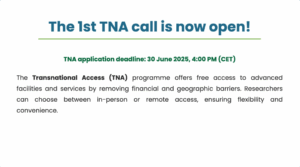Use Case 4. Microbial Inoculant effect on cereals: from controlled imaging to field validation

- Several PGPR strains are selected and requested from a microbial culture collection.
- Seedlings of cereal of interest are grown under controlled conditions with and without microbial inoculation, and under both optimal and water-limited regimes.
RGB imaging tracks plant size and growth.
- Hyperspectral imaging captures physiological traits such as water status and macronutrient dynamics over time. For the early identification of microbial effects.
- Top-performing microbial treatments from Phase 2 are applied in field plots. RGB and multispectral drones capture key agronomic traits. This validates the field relevance of the microbial effects
The use case describes an integrated scientific workflow assessing the effects of microbial inoculants on cereal crops, spanning controlled imaging experiments to field validation. It comprises three sequential scientific services:
1. Microorganism Supply by NKUA:
– Several plant growth-promoting rhizobacteria (PGPR) strains are selected and obtained from a microbial culture collection.
2. Controlled Cultivation with RGB and Hyperspectral Imaging at the SMIP Platform:
– Cereal seedlings are cultivated under controlled conditions, both with and without microbial inoculation, and under optimal and water-limited regimes.
– RGB imaging monitors plant size and growth patterns.
– Hyperspectral imaging captures physiological traits, including water status and macronutrient dynamics, enabling early detection of microbial effects.
3. Field Validation with Drone-Based Phenotyping at FieldPhen Platform (CREA-Foggia):
– The most effective microbial treatments identified in the controlled cultivation phase are applied in field trials.
– Drone-based RGB and multispectral imaging capture critical agronomic traits to validate the relevance and effectiveness of microbial treatments under real-world agricultural conditions.
This case exemplifies the integration of laboratory and field-based scientific services to validate microbial inoculant efficacy.


